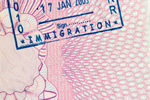How to Emigrate to France
 How to Emigrate to France
How to Emigrate to France
The initial phase in moving to France is an important one. With enough research and preparation, the procedure of emigrating to France can be a painless one! It may be more of a mental preparation than an organisation of tasks to do before moving. It is not so much a case of which house to buy and in which area, but for most it will be a case of working out if it’s the right choice. Some things cannot be planned and so a general positive approach to the whole process will be a great start to moving things in the right direction.
Employment and financing are probably the biggest issues to consider whilst planning and organising the move. In France, a mortgage is basically a loan which is based on your income. In order to have a mortgage in France, it is necessary to have a fiscal resident status – for tax purposes this is usually achieved after you have lived in the country for over 183 days. If you don’t have the luxury of funding from the sale of a property back home and subsequently have to borrow money for a French home, then there are generally two options open to you. You can either remortgage on the property you are keeping, or you can take out a new mortgage on the French property which you intend to buy and live in. A mortgage can be obtained in either Euros or sterling. A French bank account will be necessary to handle the various fees and payments encountered during the course of the buying process. Initially, renting an apartment or house may be a good place to start. This would give you a base to search around a location you are interested in for a home to buy (if you are financially able). Renting would allow you to get a feel for the area and if it is not right for you then you haven’t made a commitment and so can rent elsewhere.
Although personal contact (via telephone or in person) is a preferred method of contact for the French, the internet is a tool which can prove invaluable for researching various things before you are in the country. It is an up-to-date method of researching house prices and looking for employment. An excellent property website to explore is “Immobilier France” (www.immofrance.com), which can also be displayed in English. Google Maps is also a useful tool for exploring various locations of houses of interest in France. Some generally useful information can also be found via the websites www.expatica.com and www.relocate-france.co.uk. There are thousands of websites which specialise in overseas property. If you use a French estate agent then it is important to ensure that they are members of either the trade body “SNPI” or “FNAIM”. Make sure you bring all necessary documentation with you for arranging things like the mortgage. These include a copy of your passport(s) and birth certificate, overview of finances and marriage certificate (if applicable).
It is advisable to spend a number of weeks in the country before considering buying a place, or in fact emigrating. This may be best in the spring or autumn in order to avoid too much of a ’summer holiday’ feeling which may sway your opinions too much. There is one language in France – French. If you are not a French speaker then moving to France may seem daunting at first. It is advisable to start learning the language as soon as possible as at least a minimal standard is required to communicate. Learning French is extremely important. The French are intensely proud of their language and appreciate it when a foreigner will at least attempt to speak their language to them (even if only a small amount). Around the larger cities (such as Paris and Lyon), many people will speak English, but this is not the case for most other areas, especially rural countryside. In general, the French are a polite and kind nation, whilst also being very bureaucratic. They tend to assume that you will research and find information for yourself, rather than bringing information to your attention.
If you are not familiar with French customs then it may be worth familiarising yourself with some. For example, the way to greet people varies depending on the situation, person and time of day. The way women greet varies from handshaking to kissing an air kiss next to the cheek. Small children tend to be hugged and kissed on the cheek, whether they are known to the person or not. These small things are not necessary to research before going but are the kind of thing which may ease the transition of moving full time to France. Before leaving the UK you should contact a number of places so that you are ready to start your new life in France. If you are still earning money from activities within the UK while living abroad (such as rental income), then you may be liable to pay income tax on those earnings. Contact HM Revenue & Customs to check your status. Your bank and GP should also be notified of the move abroad. If you are getting your mail re-directed to your new address then also remember to contact the Post Office.
After making the decision to emigrate to France and knowing that it is the right choice for you (and your family, if this applies), then it seems the most important thing is not to rush your decisions. Take time to get to know an area before jumping in and buying a place to live. Once you are on the road to speaking the native language then you will be a step closer to making France your new home.


